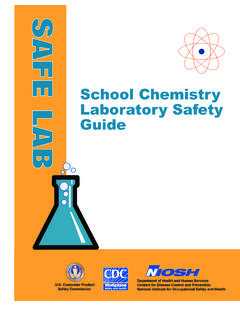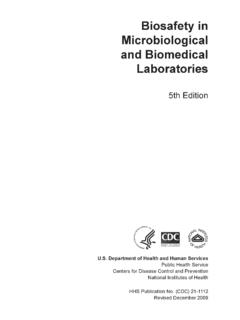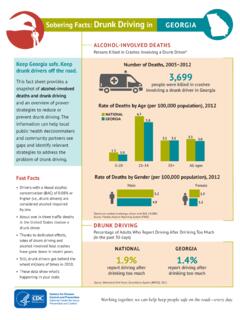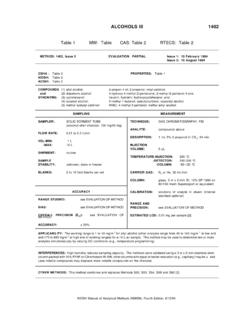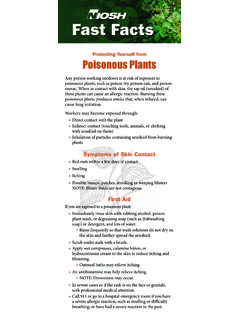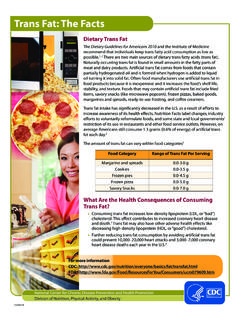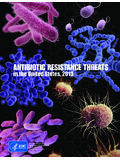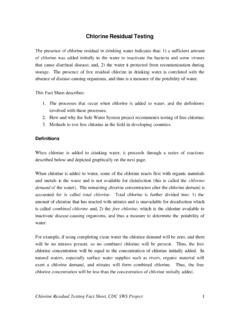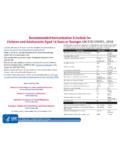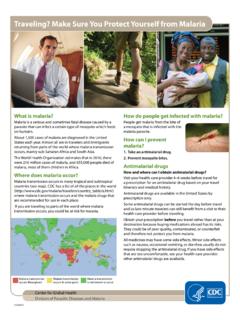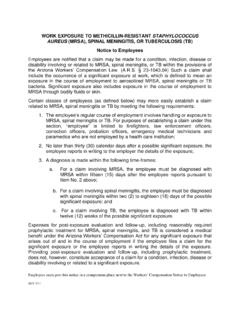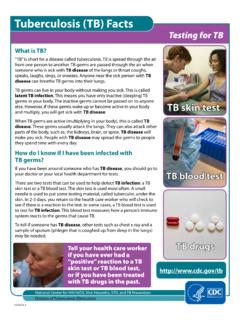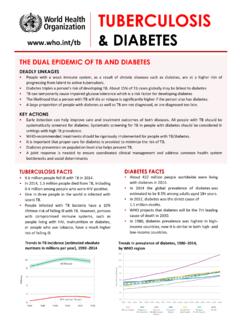Transcription of TB - Centers for Disease Control and Prevention
1 TB What You Need To Know About Tuberculosis Infection What's Inside: Take steps to make sure tb infection does not turn into TB Disease . Read this booklet to learn how you can take Control of your health. 2. Contents What it means to have TB 4. When you should have a TB skin test or TB blood 6. Treatment for TB Tips to stay on your medicine Get your questions 3. What it means to have tb infection Eddie's Story. Itojust found out I have tb infection . I was relieved find out that tb infection means I have only dormant TB germs in my body. This means the TB germs are sleeping, so they are not making me sick, and I cannot pass them to anyone else.
2 My doctor told me that sometimes the TB germs wake-up and multiply. This is called TB Disease , and if I get it, I can become very sick and can pass TB germs to others. I don't want that to happen, so I'm doing what my doctor told me, and starting on the TB medicine right away.. Eddie has tb infection . This means that: He has only dormant (sleeping) TB germs in his body, so the germs are not making him sick. He cannot pass these TB germs to others. Yet if he doesn't take medicine to kill the TB germs now, he can get sick with TB Disease in the future. And if he gets TB Disease , he can pass TB.
3 Germs to others. 4. How did I get tb infection ? TB is spread through the air from one person to another. The TB germs are passed through the air when a person who is sick with TB Disease coughs, laughs, sings, or sneezes. Like Eddie, if you breathe air that has TB germs, you may get TB. infection. You will not know you have tb infection unless you have a TB skin test or TB blood test. If left untreated, tb infection can turn into TB Disease . TB germs are passed through the air when a person who is sick with TB Disease coughs, laughs, sings, or sneezes. 5. When you should have a TB skin test or TB blood test You should have a TB skin test or TB blood test if: You have spent time with a person who has TB Disease .
4 You have HIV infection or another health problem, like diabetes, that makes it harder for your body to fight germs. You inject illegal drugs. Your doctor suggests you should be tested. Your workplace says you need to be tested. You are from a place where TB Disease is more common. This includes most countries in Latin America and the Caribbean, Africa, Asia, Eastern parts of Europe, and Russia. You spend a lot of time where TB is more common. This includes homeless shelters, drug treatment Centers , health care clinics, nursing homes, jails, or prisons. 6. Your healthcare provider said you have tb infection .
5 A person with tb infection will usually have a positive TB skin test or TB. blood test. If your TB skin test or TB blood test is positive, your healthcare provider may also do a chest x-ray to look for signs of TB Disease . If your x-ray did NOT show signs of TB Disease , you will be diagnosed with tb infection . Your healthcare provider may have also asked if you have HIV infection. That's because having HIV infection and tb infection together can make you very sick. If you don't know, ask your healthcare provider to give you an HIV test. 7. Treatment for tb infection Take your pills the right way, as your healthcare provider tells you.
6 At first, I could not understand why I had to be on the TB pills for 9 months. That seemed like a long time. And I didn't even feel sick! But now I. know that these TB germs are strong and they can take a long time to die. I made a plan to finish this medicine because I want to stay healthy for my family. I don't want to take the chance of getting sick with TB Disease someday.. 8. If you have tb infection , follow these good tips: Protect your health by taking medicine for tb infection . Take all your pills, even though you don't feel sick. Stay on the medicine to kill TB germs so you won't get TB Disease .
7 Why should I take medicine if I don't feel sick? Even though the TB germs in your body are dormant (sleeping), they are very strong. Many germs are killed shortly after you start taking your medicine, but some stay alive in your body a long time. It takes longer for them to die. As long as you have TB germs in your body, they can wake-up, multiply, and make you sick with TB Disease . The only way to get rid of TB germs is by taking TB medicines. You will need to stay on TB medicine for 3, 6, or 9. months, depending on what your doctor thinks is best for you. Talk to your healthcare provider if your medicine is making you feel sick.
8 Any medicine can cause side effects, including TB pills. Most people can take their TB medicine without any problems. 9. Call your healthcare provider right away if you have: Dizziness when sitting, standing or lying down. Less appetite, or no appetite for food. Stomach upset, nausea, or vomiting. Pain in your lower chest or heartburn. Flu-like symptoms with or without fever. Severe tiredness or weakness. Fevers or chills. Severe diarrhea or light colored stools (poop). Brown, tea-colored, or cola-colored urine. Skin or whites of your eyes appear yellow. Skin rash or itching. Bruises, or red and purple spots on your skin that you cannot explain.
9 Nosebleeds, or bleeding from your gums or around your teeth. Shortness of breath. Pain or tingling in your hands, arms and legs. NOTE: People react differently to medicines. If you think you are having any reaction to your treatment, call the doctor right away. 10. Tips to stay on your medicine routine. Try these tips to help you remember to take your TB medicine. Check off the tips you will try: oo Take your medicine at the same time every day. oo Use a pillbox and put a week's worth of pills in the box. oo Keep your medicine in one place, where you can't miss it. oo Write yourself a note.
10 Put it on your bathroom mirror or on your refrigerator. oo Wear a watch to keep track of time. Set your watch alarm for the time you need to take your pills. oo Ask a family member or friend to help you remember. oo Use a calendar to check off the days you have taken your medicine. Your healthcare provider will make sure the medicine is working for you. While on your TB medicine, you may see your healthcare provider at least one time a month. If you have other health problems, like HIV infection or hepatitis, you may need to see your healthcare provider more often. You may also need to have some blood tests along the way to make sure your body is handling the medicine well.
